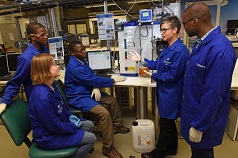Who we are :

Industrial crystallization research was initiated in the Department of Chemical Engineering in 2000 and the Crystallization and Precipitation Research Unit was formally accredited by the university in 2006.
Although industrial applications of crystallization and precipitation have a long history and precipitation has been studied scientifically since the 1930’s, understanding of this operation is still very limited. For this reason, the main aim of the Research Unit is to advance existing fundamental knowledge in the fields of crystallization and precipitation, especially related to the South African and International mineral processing and extractive metallurgy industries.
The unit focuses on two main areas of research:
- Optimising precipitation in hydrometallurgical processes. Our work on Rare Earth Elements, Rhodium and Mixed Metal Sulphide precipitation are examples of this.
- Development of innovative technologies for mining wastewater treatment. Our Eutectic Freeze Crystallization project is an example of this.
The tools used in the research include modelling and simulation approaches to industrial research, such as the particle rate process approach for modelling of industrial crystallization processes; aqueous chemistry modelling and computational fluid dynamics modelling. All of these modelling techniques are aimed at deepening the understanding of these chemically complex, multiphase processes.
What we do: Research Focus and Project Areas
Eutectic Freeze Crystallization
• Developing a continuous Eutectic Freeze Crystallizer to treat multi-component hyper saline brines
• Investigating the factors affecting phase separation in Eutectic Freeze Crystallization
• Salt purity and recovery in Eutectic Freeze Crystallization
• Ice purity and recovery in Eutectic Freeze Crystallization
• Factors affecting purity, recovery and hydrate formation of salts
• Kinetic aspects and residence time in the design and control of a Continuous Eutectic Freeze Crystallization process
Fundamentals of precipitation processes in water treatment
• Measurement of growth and aggregation kinetics of fine particles
• Developing methods to measure and model aggregation kinetics in precipitation systems
• Developing methods to measure nucleation and growth rates in sparingly soluble systems
• Computational Fluid Dynamics modelling of solid suspension behaviour
Critical Metals (Rare Earth Elements, Manganese, Lithium,...)
• Recovery of critical metals using antisolvent crystallization and precipitation
• Recovery using specialised reactors
• Investigating thermodynamic- and kinetic- aspects, and hydrodynamics
